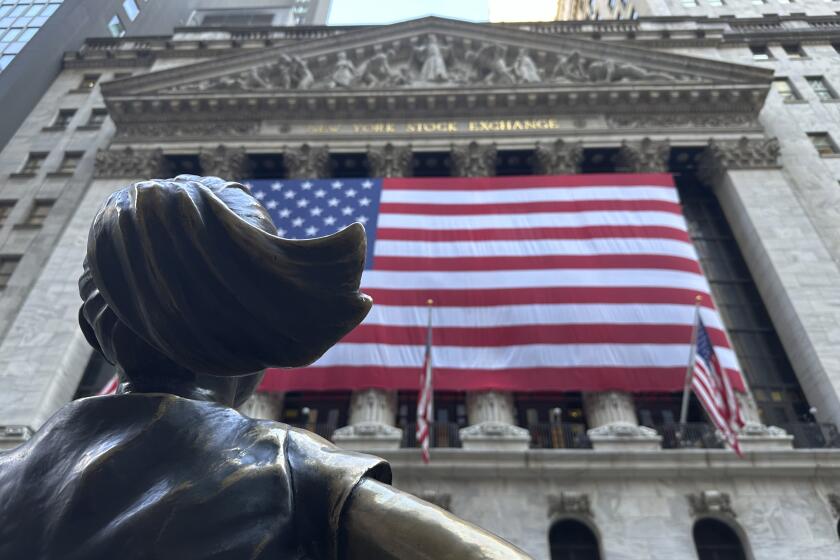ITT to Spin Off Operations Into 3 Publicly Held Firms
In one of the most dramatic breakups in U.S. corporate history, ITT Corp. announced Tuesday that it plans to split itself into three companies and dismantle what has long been one of America’s most familiar conglomerates.
The New York-based company--a global hodgepodge that at times has owned everything from Wonder Bread to Avis rental cars--plans to divide its remaining insurance, industrial and hotel/entertainment divisions into separate publicly held companies, which have combined annual sales of $25 billion.
While other companies have been broken up by government decree or sold off pieces over time, ITT’s plan is unique because it calls for one of America’s largest companies to willingly break itself apart in one fell swoop.
“It’s a watershed event in corporate America,” said analyst Jay Cohen of Salomon Bros. Inc.
ITT’s breakup is further evidence that the gigantic conglomerate--so fashionable in U.S. business during the 1960s and ‘70s--is largely a dinosaur today. It has become an enterprise that is too unwieldy in an age when corporations must be nimble and efficient, many experts believe.
Though a few big diversified companies still succeed--notably General Electric Co., AlliedSignal and Textron--the conglomerate overall “was a product of a particular time and place,” said Robert Sobel, a business-history professor at Hofstra University in New York, who has written books about ITT and other conglomerates.
“It sounded like a good idea, but it just didn’t work out,” he said.
ITT’s proposed breakup also climaxes a 16-year effort by ITT Chairman Rand V. Araskog to disassemble the far-flung empire built by former Chairman Harold S. Geneen, who turned a little overseas telephone company called International Telephone & Telegraph Corp. into a titan of American business. (ITT adopted its current name in 1983.)
Yet the bust-up of ITT--which today owns Sheraton hotels, Hartford insurance and such gaming properties as Caesars World--had been expected. Long prodded by disgruntled investors who felt the company’s stock price understated the true value of the firm’s various assets, ITT had hinted for months that it might split itself up.
When the announcement finally came Tuesday, investors cheered the move and boosted ITT’s stock price $6.25 a share to $115.50, in New York Stock Exchange composite trading.
The change is “going to make three much stronger entities,” said Thomas Hoens, an analyst at the debt-rating agency Fitch Investors Service in New York. “It’s going to be a lot easier for the stock market to understand them [and] it’s going to make it easier for bondholders to figure out what their credit risks are” with each enterprise, Hoens said.
The proposal calls for ITT’s stockholders to receive one share in each of the three new companies for every ITT share they now hold.
The new companies would be:
* ITT Hartford, the insurance business. It’s the biggest of the three with annual revenue exceeding $11 billion.
* ITT Industries, which makes automotive parts, defense and electronics gear and industrial equipment.
* The “new” ITT Corp., which would own Sheraton, Caesars World, ITT’s stake in Madison Square Garden and other entertainment holdings. Araskog, 63, would continue running that company.
The split would be only the latest transformation for a company that has reinvented itself countless times during its 75-year history.
During Geneen’s 20-year reign, ITT gobbled up literally hundreds of businesses, including Continental Baking (Wonder Bread), Avis rental cars and Rayonier forest products. Like many other conglomerates of his era, Geneen typically used ITT’s richly priced stock to pay for the acquisitions. (Geneen did not return a telephone call seeking comment.)
But when Araskog took over in 1979, he found the company burdened with debt. So he went on a massive divestiture program and has now shed more than 250 operations, including Continental, Avis and Rayonier.
Even so, Araskog also has struggled with deciding what ITT should be.
At one time he wanted ITT to be a technology powerhouse, but that ended in the mid-1980s when it ended up selling most of its telecommunications-equipment business. More recently, Araskog sold its financial-services units (other than Hartford).
A decade ago, corporate raiders, such as Irwin Jacobs, urged Araskog to spin off ITT’s operations--an idea Araskog stoutly refused to consider at the time. But he was forced to change his thinking as the 1990s arrived.
ITT’s profits, stock price and return on investment sagged even as Araskog’s compensation regularly totaled several million dollars a year.
That riled Wall Street, and big institutional investors began pressuring ITT to find ways of boosting its stock price. That pressure, in turn, led to growing speculation that Araskog would choose the breakup as a way to put an exclamation point on his tenure before he retires.
That speculation already had lifted ITT’s stock steadily higher since December, when it stood at $80 a share.
Under the spinoff plan, ITT said it expects the distribution of the new companies’ shares to be available to stockholders of record in mid-December.
The deal, though approved by ITT’s directors, remains subject to approval by its stockholders.
Other huge companies, such as Standard Oil (in 1911) and American Telephone & Telegraph (in 1984), were broken apart by government decree on antitrust grounds. More recently, retail giant Sears, Roebuck & Co. shed its Allstate insurance and other financial-services units, but that occurred in phases starting in 1992.
(BEGIN TEXT OF INFOBOX / INFOGRAPHIC)
The New Firms
The ITT Corp. conglomerate plans to spin off its businesses into three publicly held companies. Here is a brief description of the new firms:
ITT HARTFORD
Business: Insurance
1994 revenue: $11.1 billion
Chief executive: Donald R. Frahm
****
ITT INDUSTRIES
Business: Auto parts, defense electronics, fluid technology
1994 revenue: $7.6 billion
Chief executive: D. Travis Engen
****
(NEW) ITT CORP.
Business: Sheraton hotels, Caesars Palace, other entertainment
1995 revenue*: $6.5 billion
Chief executive: Rand V. Araskog
* Estimate
Source: ITT Corp.
More to Read
Inside the business of entertainment
The Wide Shot brings you news, analysis and insights on everything from streaming wars to production — and what it all means for the future.
You may occasionally receive promotional content from the Los Angeles Times.







